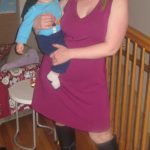By Badass Alison
I never really thought much about breastfeeding in my early twenties. I was more concerned with getting a degree, building a financial footing for myself, and being taken seriously in my chosen career field. These reasons, combined with back issues, led me to the decision to have a breast reduction at 22. In the plastic surgeon’s office, I was told of the side effects: pain, swelling, tenderness, possible anesthesia complications, and at the end of the consultation, “you may not be able to breastfeed.” “That’s ok,” I replied “It’s not that important to me.” Famous last words.
Seven years later, I am married, and pregnant with my first. My baby comes into this world via c section. The reasons for this are not important. “You gave birth to a teenager!” My OB happily says, before my husband announces “it’s a girl!” She is a whopping 10 lbs, 9 ounces. I knew, despite my reduction and the c section, that as soon as that baby was placed in my arms, I needed to do everything I possibly could to give her the best start at life.
It’s incredible how your perspective shifts so rapidly. Breastfeeding was once an afterthought, but in a flash, it had become my whole world. I saw how I could soothe my daughter at the breast. I felt the ability to do something amazing for myself and her, and I was determined to make it work. So I set myself up with (what I thought) were the best tools at my disposal. At the hospital I birthed at, I requested a Lactation Consultant and made an appointment at the Breastfeeding Clinic. I had my husband come with me for support. My daughter had lost more than 10% of her body weight upon discharge, and I was determined to not have to bottle feed, if at all possible. I was told, at our first appointment, that my daughter was barely getting any breastmilk, 5 days post-partum. I asked if she had a tongue tie. They said “no.” They checked her latch, and we were shown how to use a supplementation aid at the breast, with formula, and I rented a hospital-grade pump. I was told to pump after every feed. So for a week straight I did nothing but feed my daughter, pump and try to sleep. I think I pumped half an ounce per day, with at least 3 pumping sessions.
I was miserable. My baby wasn’t sleeping, I was in constant pain, and I couldn’t sleep when my baby slept, because I was at the mercy of my pump. I went back to the Breastfeeding Clinic, and was told that while my breastmilk output had increased, I still needed to use the supplementation aid at the breast, with formula. I went home, bought a case of formula, and cried.
My daughter’s pediatrician, at her 5 day post-partum and 2 week checkup, said that her weight gain trend was good. She also told me:
“you will want to get her on a bottle as soon as possible, breastfeeding is not beneficial past 4 months old, and you can stretch your feeds out to three hour intervals, because studies have been done on orphans that have shown that three hours between feeds is enough for optimal nutrition.” At this point, I was feeding on demand, and my daughter was eating every 45 minutes to 1.5 hours.
Because of the pain, my confusion about feedings, and what I realized were depressive thoughts creeping in, on the guidance of my doula, I sought a second opinion regarding my daughter’s breastfeeding and possible tongue tie. We went to a clinic that specializes in these issues. At the consultation, the doctor charged with performing tongue ties noted that my daughter, at 5 weeks post-partum, was only 10 lbs 1 ounce. She had not regained her birth weight. He told me that my daughter was close to being diagnosed as “failure to thrive.” I was devastated. I thought: “but I have done everything right!” I feed on demand, I pump, I use the supplementation aid with formula, what more can I do?
They told me she had a third-degree posterior tongue tie. There was no question: it was getting clipped. One quick snip, a few cries, and she latched right away, under the watchful eye of the clinic’s Lactation Consultant. She fed for an hour. We were told to come back in a week to check her progress.
I spent the week feeling like I failed as a mother. I was starving my baby, and it was happening under the care of trained medical professionals, whom I trusted. So I sat and fed my baby. And fed her. And fed her. When we returned to the doctor, my daughter had gained a pound. We were ecstatic! I stopped pumping and focused on my breastfeeding relationship with my daughter. And I stopped feeling so ashamed of having to use formula. We are breastfeeding, I choose to focus on that.
Today, at 9 months old, my daughter is thriving. But it took a long road to get there. We still use the lactation aid at the breast, and I still fill it with formula. This is what our breastfeeding relationship looks like, and for us, it is perfect. There are so many things that I wish I had known, but the biggest thing is that I didn’t know how much breastfeeding would mean to me. I wish I had known that doctors, particularly pediatricians, don’t seem to know very much about breastfeeding, or just don’t care. I wish I had cared less about what a liability my large breasts were. I wish someone had told me “you will want to breastfeed. It will mean the world to you.” Because I do. And it does. And I am grateful every single day that I had the support of my husband, and some amazing healthcare providers, to push through, and give our daughter the best possible start in life.











